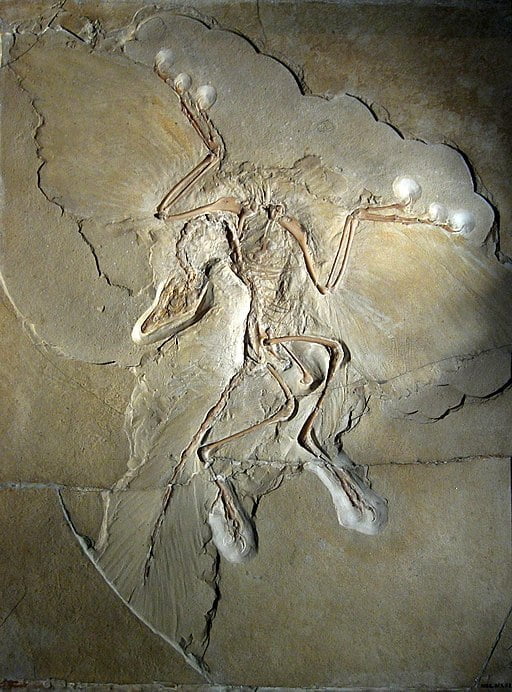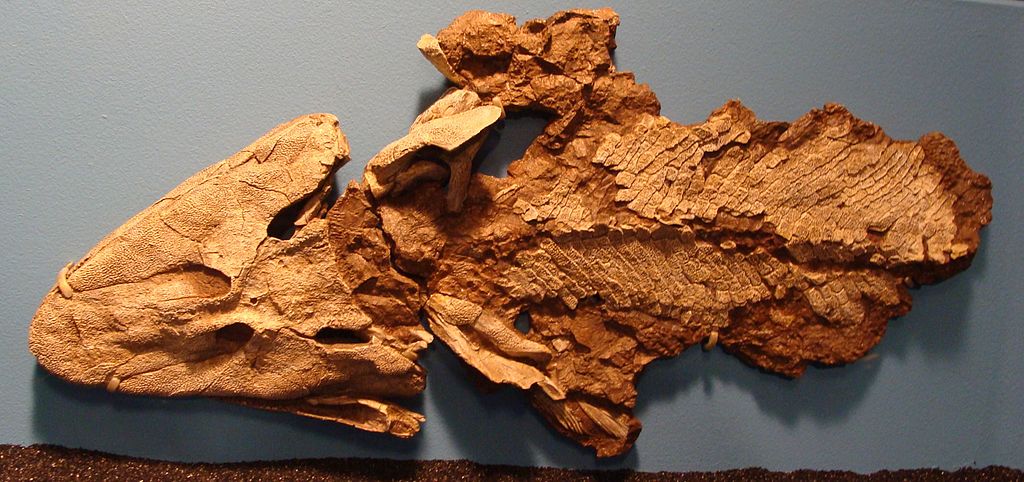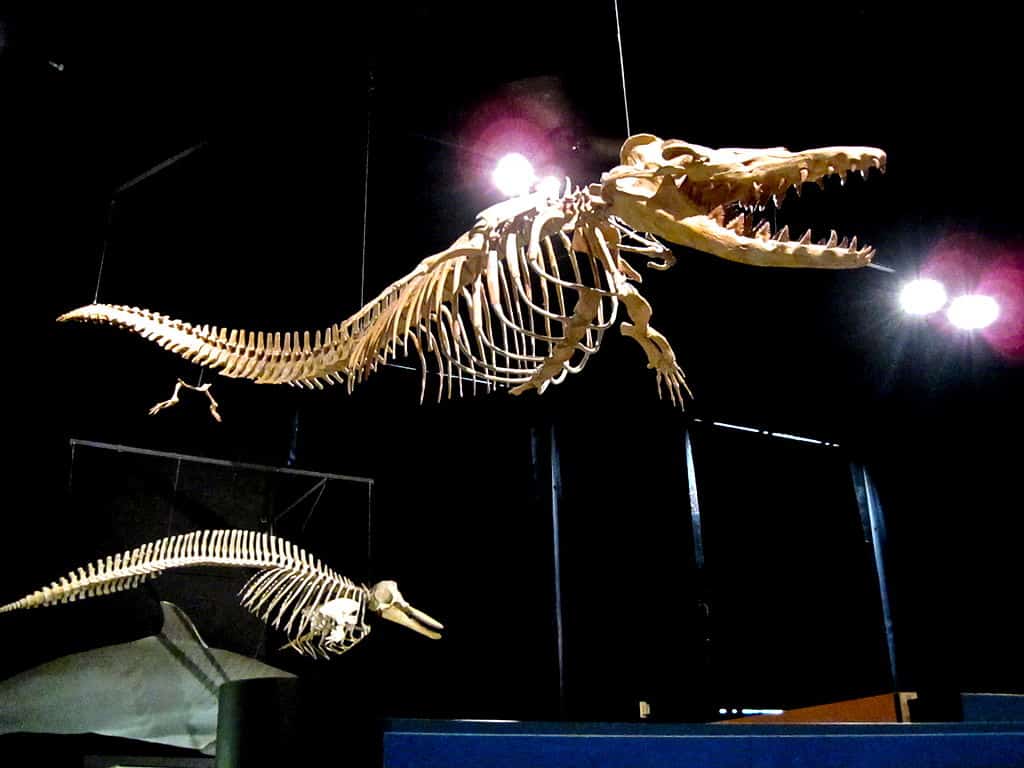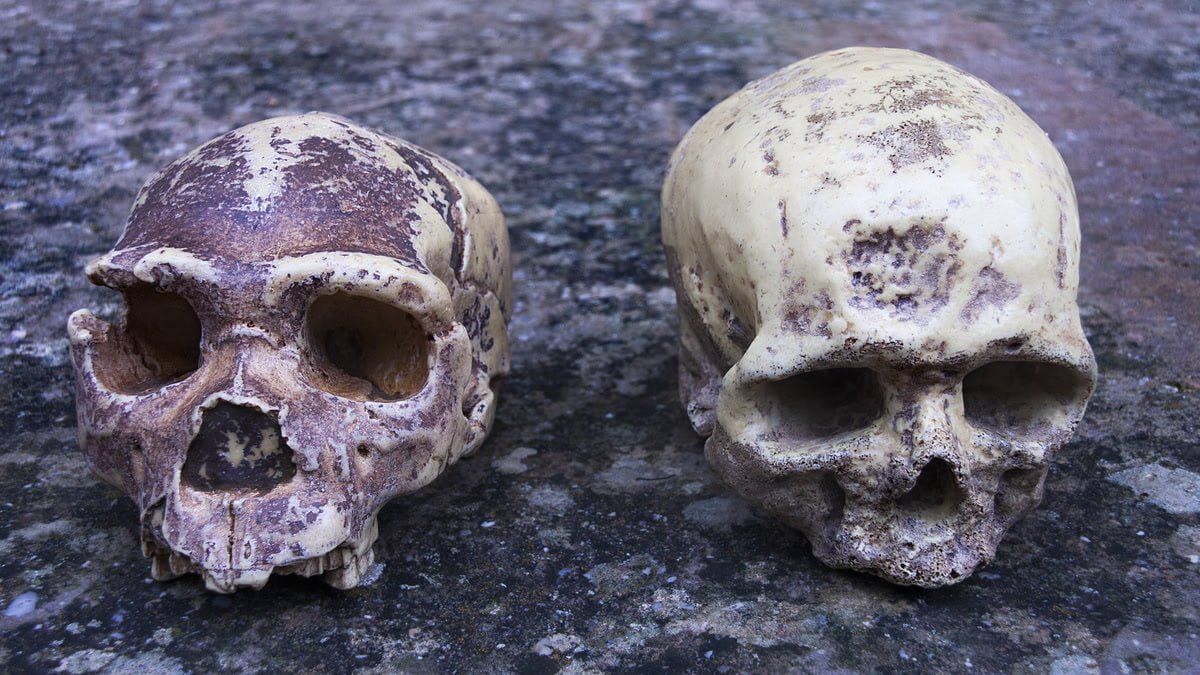Evolution is one of the most important theories in modern science. It provides a framework for understanding where modern species came from, including our own.
Evolution teaches scientists how to understand trends in biodiversity, genetics, and Earth’s history. Further, evolution provides insights into such disparate topics as endangered species conservation, vaccine development, and antibiotic, pesticide, and herbicide resistance.
How do fossils provide evidence for evolution? Fossils provide historical context for life on Earth, showcase transitional forms, and explain how life continues after extinction.
Take the image below, for example. The bacteria on the right petri dish have evolved resistance to most of the antibiotics in the white paper discs, whereas the bacteria on the left petri dish have not evolved resistance.

Scientists cite many different lines of evidence to support the theory of evolution including genetics, anatomy and morphology, biogeography, observational studies, and more. One of the most important veins of evidence for evolution is the fossil record. Let’s dive in.
The Fossil Record: The History of Life
The fossil record may be thought of as the ‘history book’ for life on Earth because it contains remains of Earth’s life from when it first appeared roughly 3.8 billion years ago up to the modern day.
As such, the fossil record tells us when organisms evolved, when they went extinct, where and how they lived, what their habitats were like, and much more. Additionally, the fossil record tells us about entire communities of organisms and how they interacted with one another.
If you’d like to learn about fossil dating, check out this article explaining how scientists determine the age of fossils.
When all of these data on ancient life are viewed as a collective whole, they paint a dynamic picture of the history of life on Earth: organisms evolve, live, go extinct, and are replaced by new organisms as the Earth changes alongside them.
This perspective of life on Earth is made possible solely by the fossil record, and it provides strong evidence for the theory of evolution. It demonstrates that life changes throughout time.
In addition to this perspective, however, the fossil record also provides evidence for evolution in the form of transitional fossils and estimates of the total number of species that have lived on Earth throughout its history.
Transitional Fossils
So-called ‘transitional’ fossils are intermediate fossils between different groups of organisms that possess traits of both groups. These fossils provide strong evidence for evolution because they demonstrate one group of organisms changing into another.
To illustrate this point, let’s look at some examples from the fossil record. In this post, we will cover Archaeopteryx, Tiktaalik, and Dorudon.
Archaeopteryx
One example of a transitional fossil, Archaeopteryx lithographica, provides evidence for the relationship between the theropod dinosaurs and birds.
To clarify, theropods include most of the carnivorous dinosaurs such as Allosaurus, Tyrannosaurus, and Velociraptor.

The fossil has feathers, similar to modern birds, but it also has a long tail, claws, and digits on its wings and teeth. These are traits that no modern birds have, but theropod dinosaurs did have. As such, scientists have concluded that Archaeopteryx is a transitional fossil between theropod dinosaurs and birds.
If you want to learn more about Archaeopteryx, the Britannica website has a great article on this amazing dinosaur.
Tiktaalik
Another example of a transitional fossil is Tiktaalik roseae. This ancient fish-like animal shares many traits with tetrapods or four-legged animals. This fossil has fins, scales, and gills, linking it with fish, but it also has a flat head as well as a tetrapod-like neck and ribs. This links it with tetrapods, as you can see from the fossil Tiktaalik on display at the Field Museum in Chicago.

Because of these similarities, scientists have concluded that Tiktaalik is a transitional fossil between fish and tetrapods. You can learn more about Tiktaalik at the University of Michigan website. Another great article is available from the University of Chicago.
Dorudon
For the final example of a transitional fossil, consider the early whale Dorudon atrox. This whale lived about 40 million years ago and shares many features with modern whales, but it also has several unusual features not seen in modern whales.
Compare the images of Dorudon atrox and a modern Sperm Whale, Physeter macrocephalus. See if you can spot any differences.
Dorudon atrox, the top skeleton, compared to a modern whale. Notice the rear limbs in the center-right of the image.

The biggest difference between the two skeletons above is their limbs: Dorudon has rear limbs and longer, more developed forearms, while the Sperm Whale has completely lost its rear limbs and has stubbier forearms: its digits comprise about half of its total arm length, while the Dorudon’s digits comprise only about a third of its total arm length.
For reference, check out this Sperm Whale skeleton. Note how tiny its pelvis is. Is it missing anything?

Extinctions Provide Evidence For Evolution
Another piece of evidence for evolution provided by the fossil record lies in the total number of species that have lived throughout time. Although the Earth currently supports up to millions of species, many more have lived in the past. Scientists generally agree that 99.9%, or 999 out of every 1000 species, have gone extinct.
To reach such an estimate, scientists use various methods such as estimates of Earth’s current biodiversity extrapolated over the past as well as species and trends discovered in the fossil record.
For so many species to have existed and gone extinct throughout Earth’s history, evolution becomes a logical necessity: how else could so many species have already come and gone before the species alive today? Where did all modern animals originate?
Evolution provides the answer. It offers a mechanism by which new species arise: speciation. Despite the extinction of nearly all living things to exist, new life forms emerge to take their place.
How Do Fossils Provide Evidence for Evolution?
Many veins of evidence support the theory of evolution, but one of the most important is the fossil record. The fossil record paints a dynamic picture of the history of life on Earth.
The fossil record demonstrates that life on Earth changes over time. Further, it provides transitional fossils, which are intermediates between two taxa. Finally, it provides an estimate of the total number of species that have lived on Earth throughout its history, which logically necessitates the theory of evolution.
If you’ve found this topic interesting, please share it with others. If you have any additional questions or suggestions, leave a comment below and stay tuned for the next article.


Greetings,
I am a student at The University of Oklahoma, I am working on an assignment concerning evolution. Are the gaps in the fossil record an issue with the case for evolution? I know transitional species have been discovered, but with the incredible span of time, and fossils really only give a snapshot of what was where it was. Meaning we have a fairly good idea of who it was, and what it may have been related to before, and after the creature lived, but how are we absolutely certain what it was exactly?
Great question!
A great source to this question can be found here: Using creation science to demonstrate evolution: application of a creationist method for visualizing gaps in the fossil record to a phylogenetic study of coelurosaurian dinosaurs – SENTER – 2010 – Journal of Evolutionary Biology – Wiley Online Library
In short… no. Gaps in the fossil record are inevitable given the rarity of fossilization and the significant limitations on our ability to uncover them. Some animals have fairly straightforward evolutionary lineages and the evidence is strong, such as the whale example. Whales are alive and can be studied and compared to extinct variants that match up.
Compare this to trying to decipher which dinosaur lineages evolved into which, and it becomes a crap shoot. Many animals are only known from a handful of fossils.
So we cannot be absolutely sure that one species shares a close evolutionary link with another. In fact, many assertions of science change when new species are discovered.
Imagine that we have a 1,000-piece puzzle of a bird. If you had say, 400 pieces you may be able to tell that the puzzle is of a bird and could convince an onlooker of the same because of the obvious features that have been put together. The counterargument would be to say that because you don’t have every piece, you can’t come to any conclusion.
This article – Misconceptions about evolution – Understanding Evolution (berkeley.edu) covers broad misconceptions about evolution, each subtopic could make for an interesting essay on its own.
Few if any things are known with certainty in science, so we act on eliminating the alternative explanations as best as possible and remain open to new data.